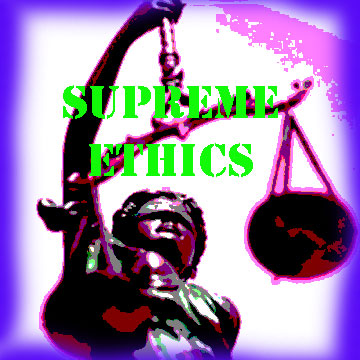
SHOULD THE SUPREME COURT HAVE A CODE OF ETHICS?
A rising chorus of voices is calling for the justices of the US Supreme Court to be subject to something akin to the code of ethics that all other federal judges must honor.
Deborah Rhode at the National Law Journal has this to say on the topic: (Rhode is the director of the Center on the Legal Profession at Stanford Law School.)
“No man shall be a judge in his own cause.” For four centuries, that has been one of the most well-established principles of Anglo-American law. Yet U.S. Supreme Court justices are a striking exception. In a letter just released by Alliance for Justice, more than a hundred law professors are calling on Congress to do something about it. Rep. Christopher Murphy (D-Conn.) is proposing to do just that and is seeking co-sponsors for a bill that would extend ethics regulation to the justices.
Recent events have again drawn attention to an anomaly in the U.S. approach to judicial ethics. Unlike any other judge, each individual who sits on the Supreme Court has unreviewable authority to determine whether he or she should withdraw from hearing a case for ethical reasons. The governing federal statute requires recusal whenever a justice’s impartiality “might reasonably be questioned.” But it provides no oversight mechanism, short of impeachment, if a justice unreasonably declines to withdraw.
Nor is there an effective review process for ethical violations. Supreme Court justices are not subject to the Code of Conduct that applies to all other federal judges. Canon 2 of that Code requires judges to avoid even the “appearance of impropriety.” Canon 5 bars them from engaging in political activity. Canon 4 bars them from fundraising. Code commentary makes clear that these prohibitions include appearances at fundraising events even for apolitical organizations. Yet when justices engage in such activities, no structure exists to hold them accountable. It is an odd oversight that the judges who exercise the greatest power in the U.S. justice system are exempt from such standards of conduct. Although by tradition the justices look for guidance to that Code and to the American Bar Association’s Model Code of Judicial Conduct, there are no sanctions for violations unless the conduct is so egregious to justify removal from office.
The problems with such a system are not hypothetical. This past January, Common Cause released information indicating that justices Antonin Scalia and Clarence Thomas attended a 2008 political retreat sponsored by Tea Party financiers Charles and David Koch and their company, Koch Industries Inc. According to a company’s later mailing describing these events, their goal has been to raise funds and discuss “plans to activate citizens…to change the balance of power in Congress.” Those plans were clearly assisted by the outcome in a case winding its way to the Court at the time of the 2008 retreat, Citizens United v. Federal Election Commission…..
A related essay from Nan Aron is running in Monday’s WaPo. Here’s how it opens:
The behavior of Supreme Court justices has come under increasing scrutiny. Questions have been raised, for instance, about the propriety of Justices Antonin Scalia and Clarence Thomas appearing at political strategy conferences hosted by the conservative Koch brothers. Other justices’ activities have also prompted concerns that the line between justice and politics is increasingly blurred.
Regardless of whether one shares fears of politicization, disputes are inevitable so long as the nation’s highest court operates with almost no compulsory ethics rules to guide — or constrain — behavior. The Supreme Court, whose members are shielded with lifetime appointments, is the only entity in our government that is not subject to mandatory ethics requirements. That is why reformers are calling for the Code of Conduct that governs all other federal judges to apply to the justices. Surely it makes no sense to have lesser standards for the highest court than those in place for lower courts….
THE SUPREMES AGREE WITH A JUDGE’S CHOICE TO DEVIATE FROM SENTENCING GUIDELINES IN ORDER TO GIVE A SECOND CHANCE
It is rare that such a case would make it to the Supremes, but this time it did, and the 8-1 Pepper decision may make a difference to a lot of others.
Robert Barnes wrote the story in Sunday’s WaPo.
Jason Pepper, a former meth addict and drug dealer from the heartland, says he got lucky when he was finally arrested. A sympathetic judge gave him a fraction of the prison time he could have received and, more importantly, sent him to a place where he got extensive drug treatment.
When his luck ran out, when appeals courts said his sentence was too lenient. Even though all acknowledged that he had turned his life around, he was sent back to prison.
But perhaps his fortunes have turned again. The Supreme Court plucked his petition from the thousands that make their way to the court each year. This month, Pepper won his case in a victory that gives federal judges more leeway to provide second chances to the criminals who come before them.
The ruling will clarify the rules that guide judges as they try to set sentences that both comport with national norms and ensure justice is done in individual cases.
But Pepper v. United States also is a reminder of the real people behind the court’s cases. It comes with a story that might make even the most objective balls-and-strikes umpire on the mahogany bench feel a tinge of (can it be said?) empathy.
